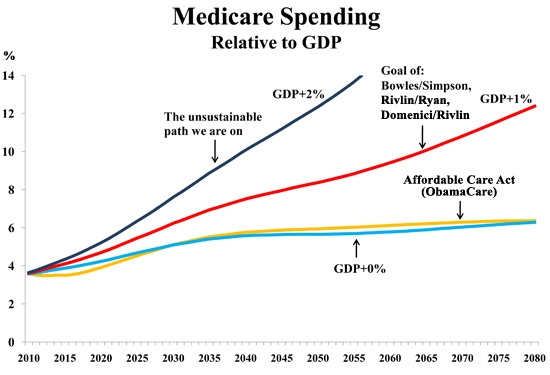Paul Ryan’s Medicare Reform Falls Short
The Medicare part of Paul Ryan’s budget proposal, Path to Prosperity, is superior to the status quo, or anything proposed by President Obama. Unfortunately, it falls short of the high standard he set himself last year, in Roadmap for America’s Future.
The Roadmap contained a very precise Medicare “payment” (in Mr. Ryan’s words) of $11,000, to be adjusted for future inflation by a factor combining changes in the Consumer Price Index and changes in medical prices, for future Medicare beneficiaries who are now under 55 years of age. Path to Prosperity, however, eliminates the “payment” in favor of the woolier “premium support.” Nor does it even report how it would calculate this premium support, beyond asserting that “wealthier beneficiaries would receive a lower subsidy” (p. 46).
Under the previous Roadmap, you could have taken the “payment” and used it to “to pay for one of the Medicare certified plans, or any other plan, such as those offered by former employers or available from the private market” (p. 51). In other words, you had the freedom to buy a Medicare Advantage plan, or to pay your employer for a retiree health plan, or buy an individual plan regulated by your state’s Insurance Commissioner.
Not any more: Under the current proposal, we’d be forced to choose a plan from a federal “tightly regulated exchange” (p. 47). We need to put this talk of “exchanges” to bed until we finally get rid of ObamaCare. People rightly associate an exchange with a limited choice of plans selected by a politically appointed board, offering benefits determined by bureaucrats’ whims. This is what motivates those who are currently blocking states from implementing ObamaCare’s Health Benefits Exchanges, or preventing Dr. Donald Berwick — an outspoken champion of medical rationing as practiced by Britain’s National Health Services — from taking over the Centers for Medicare & Medicaid Services.



